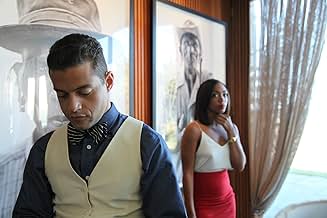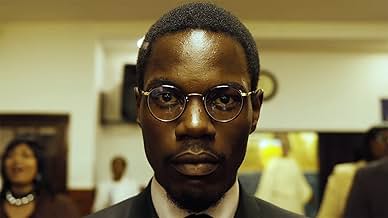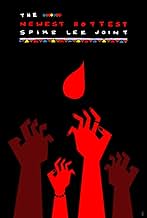AVALIAÇÃO DA IMDb
4,5/10
2 mil
SUA AVALIAÇÃO
O Doutor Hess Green se torna amaldiçoado por um artefato fazendo com que sinta vontade de ingerir sangue. Ele acaba se apaixonando e se envolvendo em questões sobre amor, sexo e vícios.O Doutor Hess Green se torna amaldiçoado por um artefato fazendo com que sinta vontade de ingerir sangue. Ele acaba se apaixonando e se envolvendo em questões sobre amor, sexo e vícios.O Doutor Hess Green se torna amaldiçoado por um artefato fazendo com que sinta vontade de ingerir sangue. Ele acaba se apaixonando e se envolvendo em questões sobre amor, sexo e vícios.
- Direção
- Roteiristas
- Artistas
Felicia Pearson
- Lucky Mays
- (as Felicia 'Snoop' Pearson)
Stephen McKinley Henderson
- Deacon Yancy
- (as Stephen Henderson)
- Direção
- Roteiristas
- Elenco e equipe completos
- Produção, bilheteria e muito mais no IMDbPro
Avaliações em destaque
I have loved most of the Spike Lee joints I have seen, but this time I felt much disappointed with the remake of "Ganja & Hess". To start with I still do not fathom the cult following of the original: it is true that for its time it was an innovative approach to cinema dealing with paranormal activity, and quite different from most African-American motion pictures of the 1970s, but at the same time I found its central premise a bit pompous and wordy, and many viewers' reactions a bit exaggerated. The so admired "slickness" of both versions is too ornate for me, and quite distracting: it makes the plot look sillier than it is for all its pretension that we are witnessing an "awesome" psychological drama. I have to admit though that Bill Gunn had more control over his own material than Lee: the remake is amazingly disjointed and even longer than the original, with extensive stretches of "music videos" that could have been cut without affecting the drama. As a matter of fact Lee's film contains good elements that do no blend, as Bruce Hornsby's score and varied songs so omnipresent and badly dosed that the soundtrack becomes annoying, no matter how good the composition or the tune are. Then take the beautiful opening credits sequence or the great church scene featuring Valerie Simpson singing and playing the piano, mix them with the obligatory lesbian scene, the dispensable garden cocktail for white scholars, the unexplained trips to town (Hess must certainly be a hot specialist on the Ashanti culture, but we see little of that), the trivial little procession after the wedding... and you get something very bloody but hardly sweet. Your "cultural background" will not suffer much if you skip this.
As an old fan of Ganja & Hess, i was very curious to see Spike Lee's take of this arty oddity.
Very few things changed from the script, except the part of minor characters : the slow pace, the theatrical acting and the general mood are scrupulously respected, so you must expect an art-et-essai movie rather than an usual vampire flick.
I didn't found it as bad as the other reviewers, even if I can express a few reserves : the score that sometimes looks like a sort of car play-list (the original was quite experimental), or the lack of twisted shots that made the first movie so unique.
However, I hope that it will encourage the new generation to rediscover the 73 version that still shines like a black diamond, with its strange mix of perversity and religious knick-knack.
Very few things changed from the script, except the part of minor characters : the slow pace, the theatrical acting and the general mood are scrupulously respected, so you must expect an art-et-essai movie rather than an usual vampire flick.
I didn't found it as bad as the other reviewers, even if I can express a few reserves : the score that sometimes looks like a sort of car play-list (the original was quite experimental), or the lack of twisted shots that made the first movie so unique.
However, I hope that it will encourage the new generation to rediscover the 73 version that still shines like a black diamond, with its strange mix of perversity and religious knick-knack.
Spike Lee is one of the premiere directors of my generation. With that said, I am still trying to figure out the focus and purpose of this movie. The actors, many of whom, we've seen in other Lee films, are so subdued and non significant. The movie seems to lack...well, life. His career has created valuable works that have symbolically and literally offered calls for self-awareness and offered insights into the social-political realities of African-Americans and America in general. I can't figure out what significance this movie has. There are some disturbing scenes that do not seem to add any insights or purpose to the movies story. The few things I gathered from this are: rich/poor exploitation, addiction, socio-sexual dynamic, and Sankofa. The story telling doesn't offer anything new or dynamic. So, with a heavy heart, I give this a thumbs down and not let this be representative of Spikes true genius!
Dr. Hess Green becomes cursed by a mysterious ancient African artifact and is overwhelmed with a new-found thirst for blood.
Spike Lee has made a very strange film here. Maybe because it was based on another film that happens to be rather strange ("Ganja and Hess") or maybe because it was filmed with a low budget and short on time, with relatively unknown actors... but there is something decidedly off about the picture.
Like the original, there is an ongoing metaphor about addiction. The main character is not a vampire in the traditional sense, despite an unquenchable thirst for blood. He expresses that many (perhaps most) people have addictions... drugs, money, alcohol, women... his is just different.
The Jesus parallel is played up from the original. There is indeed something strange about a man (Jesus) who asks his followers to eat his flesh and drink his blood. Christians, of course, do not find it strange. And that makes the parallel interesting... why do we recoil at one man's thirst for blood and yet look forward to drinking blood each Sunday without thinking anything of it?
Spike Lee has made a very strange film here. Maybe because it was based on another film that happens to be rather strange ("Ganja and Hess") or maybe because it was filmed with a low budget and short on time, with relatively unknown actors... but there is something decidedly off about the picture.
Like the original, there is an ongoing metaphor about addiction. The main character is not a vampire in the traditional sense, despite an unquenchable thirst for blood. He expresses that many (perhaps most) people have addictions... drugs, money, alcohol, women... his is just different.
The Jesus parallel is played up from the original. There is indeed something strange about a man (Jesus) who asks his followers to eat his flesh and drink his blood. Christians, of course, do not find it strange. And that makes the parallel interesting... why do we recoil at one man's thirst for blood and yet look forward to drinking blood each Sunday without thinking anything of it?
In this Independent, Kick-Starter Film there is much "Blackness", Typical of Spike Lee. From the Opening Non-Sequitur of Free-Style "Dancing' in the the Streets" to all of the Black Heritage with Culture Wall Hangings and "Revival Meeting" Church Whailings, there is "Blackness" Everywhere.
Even the Borderline Blasphemous (with context to the Film) Title is "Black Speak". The Film, a Remake of a 1972 "Blaxploitation" Called "Ganja and Hess", is the Story of an Upper-Class Blood Licker. It's a Beautifully Shot, Mess of a Story about, one Guesses, Addiction. But Who Knows? The Movie is so Everywhere the Message gets Lost somewhere between the Soft-Porn and the Awful Acting.
The Film's Ambiguity Sparks Over Analysis. Truth be Told the Movie is Visually Arresting and Not Much Else. It's Different, certainly Not for Everyone, and is somewhat Engaging, but the Pace and the Script are so Slow and Uninteresting that there is Never any real Connection Between the Audience and the Screen. It's Voyeuristic and Self-Indulegent, even more so than usual for the Director, to a Fault.
Overall, Recommended for Art-House Patrons, Spike Lee Check-Listers, and Seekers of Off-Beat and Midnight Type Movies.
There is an Artist at Work here, and like All Artists, Not Every Work is a Masterpiece.
Even the Borderline Blasphemous (with context to the Film) Title is "Black Speak". The Film, a Remake of a 1972 "Blaxploitation" Called "Ganja and Hess", is the Story of an Upper-Class Blood Licker. It's a Beautifully Shot, Mess of a Story about, one Guesses, Addiction. But Who Knows? The Movie is so Everywhere the Message gets Lost somewhere between the Soft-Porn and the Awful Acting.
The Film's Ambiguity Sparks Over Analysis. Truth be Told the Movie is Visually Arresting and Not Much Else. It's Different, certainly Not for Everyone, and is somewhat Engaging, but the Pace and the Script are so Slow and Uninteresting that there is Never any real Connection Between the Audience and the Screen. It's Voyeuristic and Self-Indulegent, even more so than usual for the Director, to a Fault.
Overall, Recommended for Art-House Patrons, Spike Lee Check-Listers, and Seekers of Off-Beat and Midnight Type Movies.
There is an Artist at Work here, and like All Artists, Not Every Work is a Masterpiece.
Você sabia?
- CuriosidadesFilming was completed in 16 days.
- ConexõesReferenced in Harmontown: Explain Your World View (2017)
Principais escolhas
Faça login para avaliar e ver a lista de recomendações personalizadas
- How long is Da Sweet Blood of Jesus?Fornecido pela Alexa
Detalhes
- Data de lançamento
- País de origem
- Central de atendimento oficial
- Idioma
- Também conhecido como
- Da Sweet Blood of Jesus
- Locações de filme
- Empresa de produção
- Consulte mais créditos da empresa na IMDbPro
Bilheteria
- Orçamento
- US$ 1.420.000 (estimativa)
Contribua para esta página
Sugerir uma alteração ou adicionar conteúdo ausente




































